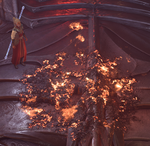Ad placeholder
Surfaces: Difference between revisions
Jump to navigation
Jump to search
(bug) |
(→Bugs) |
||
| Line 122: | Line 122: | ||
== Bugs == | == Bugs == | ||
* If creature is already on the surface, creating new surface | * If a creature is already on the surface, creating a new surface does not affect the creature. For example, if throwing water on a creature and casting {{SAI|Evard's Black Tentacles}}, the creature will not be affected by the tentacles, unless it moves around on its turn. This includes blood, which means if using an {{SmRarityItem|Arrow of Acid}} on creature, this creature will not have tzhe {{cond|Acid}} condition, because the weapon damage made it spill blood first and then the Acid surface is created.{{verify}} | ||
==See Also== | ==See Also== | ||
Latest revision as of 03:07, 27 November 2024
Surfaces are a type of area. It is a flat layer of some type of substance that covers the ground, and has a unique effect when a creature steps on it. Many abilities and magical effects can create a surface, and they can sometimes be removed or converted into different surfaces with other elements or substances. The effects of surfaces can be avoided with abilities such as Fly.
The player can Dip their weapon into Fire and Hellfire surfaces to receive Dipped in Fire, and Simple Toxin surfaces to receive Dipped in Poison.
Ice, Lava and Web surfaces also impose Difficult Terrain, which doubles the cost of moving while on the surface.
Types of surfaces[edit | edit source]
| Surface | Effects |
|---|---|
| |
| |
| |
| |
|
| |
| |
| |
| |
|
| |
| |
| |
| |
|
| |
| |
|
| |
| |
| |
|
| |
Bugs[edit | edit source]
- If a creature is already on the surface, creating a new surface does not affect the creature. For example, if throwing water on a creature and casting , the creature will not be affected by the tentacles, unless it moves around on its turn. This includes blood, which means if using an
 Arrow of Acid on creature, this creature will not have tzhe condition, because the weapon damage made it spill blood first and then the Acid surface is created.[Needs Verification]
Arrow of Acid on creature, this creature will not have tzhe condition, because the weapon damage made it spill blood first and then the Acid surface is created.[Needs Verification]
